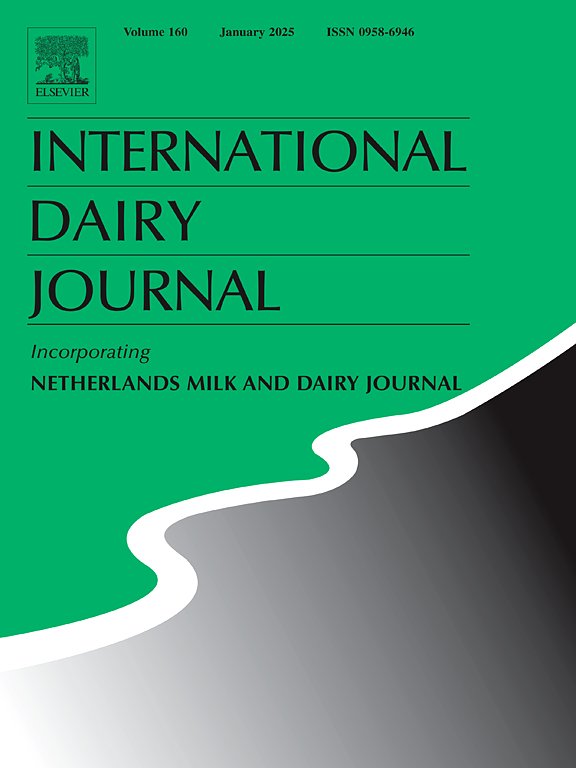Impact of psychrotrophic bacteria in raw milk on the quality and stability of UHT milk in Tunisia
IF 3.1
3区 农林科学
Q2 FOOD SCIENCE & TECHNOLOGY
引用次数: 0
Abstract
This study examines the impact of psychrotrophic bacteria in raw milk on the quality and stability of Ultra-High Temperature (UHT) milk. Twelve batches of raw milk were assessed for physicochemical and microbiological quality before UHT processing and storage at 30 °C for 70 days. Samples were analyzed every 10 days for pH, fat content, protein, acidity, stability, proteolytic activity, and microbiological changes. The obtained data demonstrated that psychrotrophic bacterial levels in raw milk significantly influence UHT milk stability and quality over time. All physicochemical parameters declined throughout the storage period at 30 °C. A significant correlation was observed between psychrotrophic bacterial counts in raw milk, protein degradation, enzymatic activity, and stability. Microbiological analyses confirmed the total absence of targeted microorganisms in UHT milk, highlighting the effectiveness of UHT processing in eliminating microbial contaminants and ensuring hygienic quality. These findings provide valuable insights into UHT-milk deterioration mechanisms linked to psychrotrophic bacterial activity in raw milk. This research opens new avenues for developing strategies to inactivate heat-resistant enzymes produced by psychrotrophic bacteria, ultimately enhancing the shelf-life and quality of UHT milk.
突尼斯生奶中的精神营养菌对超高温灭菌奶质量和稳定性的影响
本研究考察了原料奶中嗜冷细菌对超高温牛奶质量和稳定性的影响。在UHT处理和30°C保存70天之前,对12批原料奶进行了理化和微生物质量评估。每10天分析一次样品的pH、脂肪含量、蛋白质、酸度、稳定性、蛋白水解活性和微生物变化。所获得的数据表明,随着时间的推移,原料奶中的精神营养细菌水平显著影响UHT奶的稳定性和质量。在30°C贮藏期间,所有理化参数均下降。我们观察到原料奶中嗜冷细菌数量、蛋白质降解、酶活性和稳定性之间存在显著的相关性。微生物学分析证实,UHT牛奶中完全不存在目标微生物,突出了UHT处理在消除微生物污染物和确保卫生质量方面的有效性。这些发现为原料奶中与嗜冷细菌活性相关的超高温牛奶变质机制提供了有价值的见解。本研究为开发灭活由嗜冷细菌产生的耐热酶的策略开辟了新的途径,最终提高UHT牛奶的保质期和质量。
本文章由计算机程序翻译,如有差异,请以英文原文为准。
求助全文
约1分钟内获得全文
求助全文
来源期刊

International Dairy Journal
工程技术-食品科技
CiteScore
6.50
自引率
9.70%
发文量
200
审稿时长
49 days
期刊介绍:
The International Dairy Journal publishes significant advancements in dairy science and technology in the form of research articles and critical reviews that are of relevance to the broader international dairy community. Within this scope, research on the science and technology of milk and dairy products and the nutritional and health aspects of dairy foods are included; the journal pays particular attention to applied research and its interface with the dairy industry.
The journal''s coverage includes the following, where directly applicable to dairy science and technology:
• Chemistry and physico-chemical properties of milk constituents
• Microbiology, food safety, enzymology, biotechnology
• Processing and engineering
• Emulsion science, food structure, and texture
• Raw material quality and effect on relevant products
• Flavour and off-flavour development
• Technological functionality and applications of dairy ingredients
• Sensory and consumer sciences
• Nutrition and substantiation of human health implications of milk components or dairy products
International Dairy Journal does not publish papers related to milk production, animal health and other aspects of on-farm milk production unless there is a clear relationship to dairy technology, human health or final product quality.
 求助内容:
求助内容: 应助结果提醒方式:
应助结果提醒方式:


